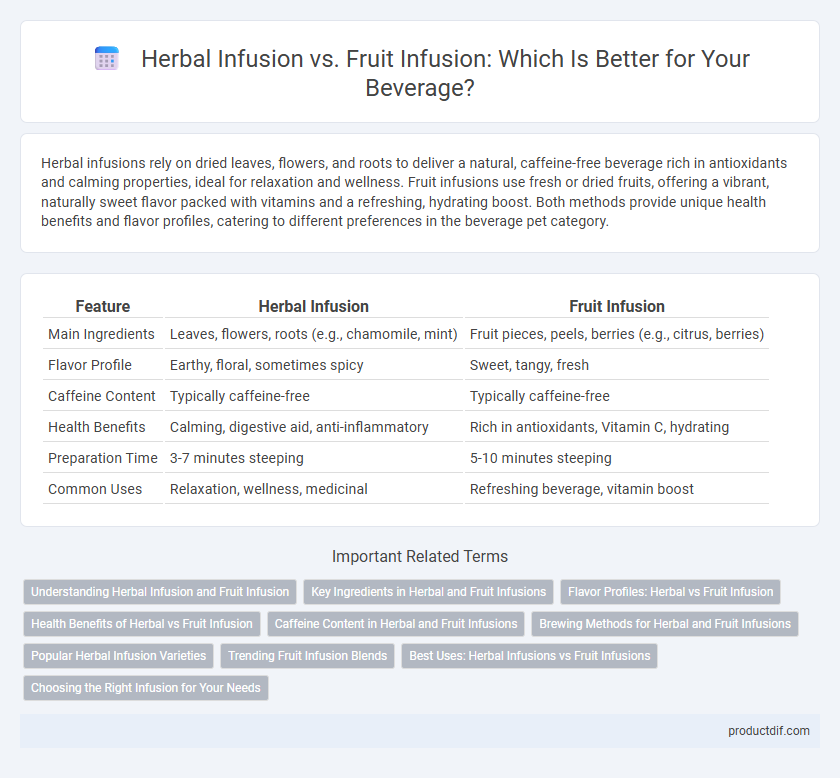Herbal infusions rely on dried leaves, flowers, and roots to deliver a natural, caffeine-free beverage rich in antioxidants and calming properties, ideal for relaxation and wellness. Fruit infusions use fresh or dried fruits, offering a vibrant, naturally sweet flavor packed with vitamins and a refreshing, hydrating boost. Both methods provide unique health benefits and flavor profiles, catering to different preferences in the beverage pet category.
Table of Comparison
| Feature | Herbal Infusion | Fruit Infusion |
|---|---|---|
| Main Ingredients | Leaves, flowers, roots (e.g., chamomile, mint) | Fruit pieces, peels, berries (e.g., citrus, berries) |
| Flavor Profile | Earthy, floral, sometimes spicy | Sweet, tangy, fresh |
| Caffeine Content | Typically caffeine-free | Typically caffeine-free |
| Health Benefits | Calming, digestive aid, anti-inflammatory | Rich in antioxidants, Vitamin C, hydrating |
| Preparation Time | 3-7 minutes steeping | 5-10 minutes steeping |
| Common Uses | Relaxation, wellness, medicinal | Refreshing beverage, vitamin boost |
Understanding Herbal Infusion and Fruit Infusion
Herbal infusion involves steeping leaves, flowers, seeds, or roots from plants like chamomile, mint, or hibiscus in hot water to extract flavors and beneficial compounds without using tea leaves. Fruit infusion uses fresh or dried fruits such as berries, citrus, or apples, immersing them in water to release natural sugars, vitamins, and antioxidants for a refreshing and flavorful drink. Both methods provide unique aromas and health benefits, with herbal infusions often targeting relaxation or digestion, while fruit infusions emphasize hydration and vitamin intake.
Key Ingredients in Herbal and Fruit Infusions
Herbal infusions primarily feature key ingredients such as chamomile, peppermint, and hibiscus, known for their soothing and therapeutic properties. Fruit infusions emphasize natural flavors derived from berries, citrus peels, and tropical fruits like mango or pineapple, providing a vibrant and refreshing taste profile. The distinct botanical compounds in herbs contribute calming effects, while antioxidants and vitamins in fruit infusions support hydration and immune health.
Flavor Profiles: Herbal vs Fruit Infusion
Herbal infusions offer a complex flavor profile characterized by earthy, aromatic, and sometimes slightly bitter notes derived from herbs like chamomile, mint, and rosemary. Fruit infusions tend to deliver vibrant, sweet, and tangy flavors, enriched by natural sugars and acids from ingredients like berries, citrus, and apples. The distinctive taste differences influence beverage selection, with herbal infusions favoring calming, soothing experiences and fruit infusions providing refreshing, zesty sensations.
Health Benefits of Herbal vs Fruit Infusion
Herbal infusions offer antioxidants, anti-inflammatory compounds, and natural compounds supporting digestion and immune health, making them effective for overall wellness. Fruit infusions provide essential vitamins such as vitamin C, hydration support, and natural sweetness without added sugars, enhancing skin health and boosting energy levels. Choosing herbal or fruit infusions depends on desired health benefits, with herbal blends focusing on medicinal effects and fruit infusions emphasizing nutritional value.
Caffeine Content in Herbal and Fruit Infusions
Herbal infusions typically contain no caffeine as they are made from various herbs, flowers, and roots, offering a naturally caffeine-free beverage option. Fruit infusions also generally have no caffeine unless blended with tea leaves or caffeinated ingredients, making them suitable for those avoiding stimulants. Understanding the caffeine content in herbal and fruit infusions is essential for individuals seeking a relaxing drink or managing their caffeine intake.
Brewing Methods for Herbal and Fruit Infusions
Brewing methods for herbal infusions typically involve steeping dried herbs in hot water at temperatures between 90-100degC for 5-15 minutes to extract delicate flavors and beneficial compounds. Fruit infusions often use cold brewing or shorter steeping times with slightly lower temperatures, around 70-80degC, preserving the natural sweetness and vitamin content of fresh or dried fruits. Optimal extraction techniques enhance the aromatic profile and antioxidant properties specific to each infusion type.
Popular Herbal Infusion Varieties
Popular herbal infusion varieties include chamomile, peppermint, and rooibos, known for their soothing and digestive benefits. Unlike fruit infusions that emphasize natural sweetness and vibrant flavors, herbal infusions often feature calming, anti-inflammatory, and antioxidant properties. Herbal blends such as lavender and ginger are also favored for their unique aromatic profiles and health-promoting effects.
Trending Fruit Infusion Blends
Trending fruit infusion blends highlight vibrant combinations such as strawberry-kiwi, mango-pineapple, and blueberry-lemon, offering natural sweetness and rich antioxidants. These blends often include superfruits like acai and pomegranate, enhancing both flavor complexity and health benefits like vitamin C and polyphenols. Fruit infusions are favored for their refreshing taste profiles and appeal as low-calorie, hydrating alternatives in the beverage market.
Best Uses: Herbal Infusions vs Fruit Infusions
Herbal infusions are best suited for relaxation, digestion aid, and medicinal purposes due to their natural therapeutic properties and calming effects. Fruit infusions excel in hydration and vitamin supplementation, offering a refreshing taste rich in antioxidants and essential nutrients. Choosing between herbal and fruit infusions depends on the intended health benefits and flavor preferences targeted.
Choosing the Right Infusion for Your Needs
Herbal infusions offer a caffeine-free option with calming properties derived from ingredients like chamomile and peppermint, ideal for relaxation and digestive support. Fruit infusions provide a naturally sweet and refreshing taste, rich in antioxidants and vitamins from berries, citrus, and hibiscus, perfect for hydration and immune boosting. Selecting the right infusion depends on whether you prioritize health benefits like stress relief or a flavorful, nutrient-packed drink.
Herbal Infusion vs Fruit Infusion Infographic

 productdif.com
productdif.com